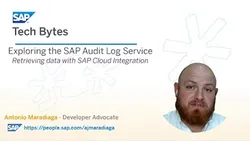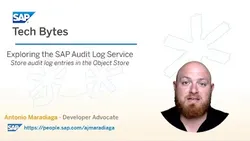
Two-Tier ERP with SAP S&4HANA Cloud 
ADVERTISEMENT
Course Feature
![]() Cost:
Cost:
Free
![]() Provider:
Provider:
openSAP
![]() Certificate:
Certificate:
Paid Certification
![]() Language:
Language:
English
![]() Start Date:
Start Date:
On-Demand
Course Overview
❗The content presented here is sourced directly from openSAP platform. For comprehensive course details, including enrollment information, simply click on the 'Go to class' link on our website.
Updated in [May 19th, 2023]
This course provides an overview of two-tier ERP with SAP S/4HANA Cloud. It covers the business case for two-tier ERP, how master data can be handled centrally, and which integration concepts are applicable in a two-tier ERP model. It also provides an introduction to the finance and sales processes, as well as manufacturing and procurement use cases available with the latest release of SAP S/4HANA Cloud. Additionally, the course includes a special unit from one of our early SAP S/4HANA Cloud adopters, Topcon Positioning Systems, who will share their perspective and experience of how they successfully leveraged the concept of two-tier ERP with their on-premise ERP system and SAP S/4HANA Cloud.
[Applications]
Upon completion of this course, participants should be able to apply the concepts of two-tier ERP with SAP S/4HANA Cloud to their own organizations. They should be able to understand the business case for two-tier ERP, and be able to identify the integration concepts applicable in a two-tier ERP model. Participants should also be able to identify the finance and sales processes, as well as the manufacturing and procurement use cases available with the latest release of SAP S/4HANA Cloud.
[Career Paths]
Job Position Paths:
1. SAP S/4HANA Cloud Consultant: SAP S/4HANA Cloud Consultants are responsible for helping organizations implement and maintain two-tier ERP systems. They must have a deep understanding of the SAP S/4HANA Cloud platform and be able to provide guidance on how to best utilize the platform to meet the organization’s needs. As the demand for two-tier ERP systems increases, the need for experienced SAP S/4HANA Cloud Consultants will also increase.
2. ERP Integration Specialist: ERP Integration Specialists are responsible for integrating two-tier ERP systems with other systems and applications. They must have a deep understanding of the SAP S/4HANA Cloud platform and be able to provide guidance on how to best integrate the platform with other systems. As organizations continue to expand and diversify their operations, the need for experienced ERP Integration Specialists will also increase.
3. Business Process Analyst: Business Process Analysts are responsible for analyzing and optimizing business processes in two-tier ERP systems. They must have a deep understanding of the SAP S/4HANA Cloud platform and be able to provide guidance on how to best optimize the platform for the organization’s needs. As organizations continue to look for ways to improve their operations, the need for experienced Business Process Analysts will also increase.
4. Data Scientist: Data Scientists are responsible for analyzing and interpreting data in two-tier ERP systems. They must have a deep understanding of the SAP S/4HANA Cloud platform and be able to provide guidance on how to best utilize the platform to gain insights from the data. As organizations continue to look for ways to leverage data to gain a competitive advantage, the need for experienced Data Scientists will also increase.
[Education Paths]
Recommended Degree Paths:
1. Bachelor of Science in Business Administration: This degree program provides students with a comprehensive understanding of business principles and practices, including accounting, finance, marketing, and operations. It also covers topics such as organizational behavior, business law, and economics. This degree is ideal for those looking to pursue a career in business management or administration.
2. Master of Science in Information Systems: This degree program focuses on the development and management of information systems and technology. It covers topics such as database design, software engineering, and system analysis. This degree is ideal for those looking to pursue a career in IT management or consulting.
3. Master of Science in Business Analytics: This degree program focuses on the use of data and analytics to make informed business decisions. It covers topics such as data mining, predictive analytics, and machine learning. This degree is ideal for those looking to pursue a career in data science or analytics.
4. Master of Science in Supply Chain Management: This degree program focuses on the management of supply chains, from procurement to delivery. It covers topics such as logistics, inventory management, and supply chain optimization. This degree is ideal for those looking to pursue a career in supply chain management or consulting.
Developing Trends:
1. Bachelor of Science in Business Administration: This degree is becoming increasingly popular as businesses become more complex and require more specialized knowledge. As businesses become more global, the need for professionals with a comprehensive understanding of business principles and practices is growing.
2. Master of Science in Information Systems: This degree is becoming increasingly important as businesses rely more heavily on technology and data. As businesses become more digital, the need for professionals with a deep understanding of information systems and technology is growing.
3. Master of Science in Business Analytics: This degree is becoming increasingly popular as businesses become more data-driven. As businesses become more reliant on data and analytics, the need for professionals with a deep understanding of data science and analytics is growing.
4. Master of Science in Supply Chain Management: This degree is becoming increasingly important as businesses become more complex and global. As businesses become more reliant on efficient supply chains, the need for professionals with a deep understanding of supply chain management is growing.
Course Provider

Provider openSAP's Stats at AZClass
Discussion and Reviews
0.0 (Based on 0 reviews)
Explore Similar Online Courses

The Art of Creating an Infographic (Without Having to Be a Designer)

Elementary Spanish I Refresher Course

Python for Informatics: Exploring Information

Social Network Analysis

Introduction to Systematic Review and Meta-Analysis

The Analytics Edge

DCO042 - Python For Informatics

Causal Diagrams: Draw Your Assumptions Before Your Conclusions

Whole genome sequencing of bacterial genomes - tools and applications

Exploring the SAP Audit Log Service - Using SAP Cloud Integration

Logging in and configuration with btp the SAP Business Technology Platform CLI


Start your review of Two-Tier ERP with SAP S&4HANA Cloud